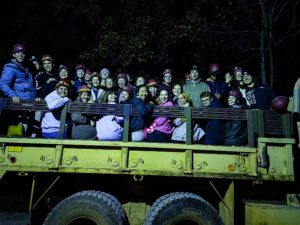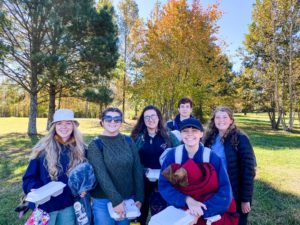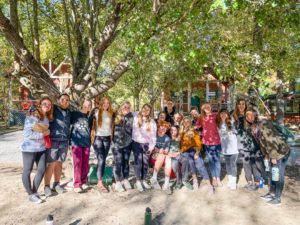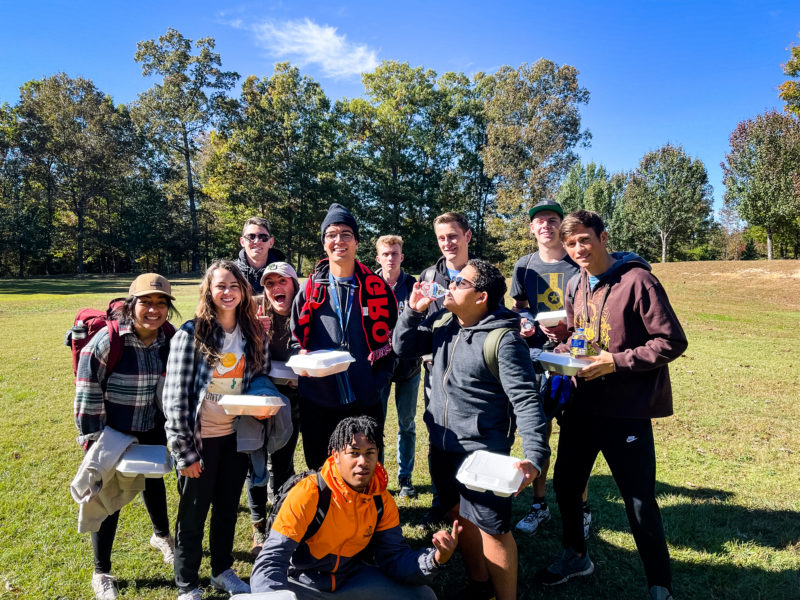Part 1: Experience
In the final week of October, as the first hints of winter crept into the air, we had the privilege of going on Impact’s Spiritual Rhythms trip. The leaves had already begun to shift their colors from vibrant greens to festive yellows and oranges by the time we made our retreat to the mountains of Alabama. Lodging was made in quaint log cabins thoughtfully positioned in a horseshoe formation surrounded by forest and was provided by Camp To Know Him. Suitemates were stationed together in one cabin, resulting in countless rambunctious conversations and a deepening of pre-existing relationships. Our break was a much-needed breath of fresh air, taking us from the constant busyness of life and throwing us into a world of low content lessons and ample time to practice the spiritual disciplines we had been learning about such as solitude, celebration, communion, and confession; both in our groups and in solitude.

 You may be pondering, “what are spiritual disciplines and why do we need to practice them?” I am so glad you asked! Spiritual disciplines are a means to the end of shalom. Shalom is a Hebrew word that translates to “peace” but its meaning goes far beyond that. Shalom is what Adam and Eve experienced in The Garden; that open communication with God and absence of all sin, worry, and every earthly strife. Shalom is being right with God. In preparation for this trip, we read a book called Habits of Grace which showed us that, in the realm of spiritual disciplines, just trying to get better is ultimately futile, rather, we should devote our time and energy to training our spiritual discipline muscles. When trials arise, it will be far easier to respond well when we have practiced patience or solitude or some other discipline if we have trained than if we are just relying on the strength of will.
You may be pondering, “what are spiritual disciplines and why do we need to practice them?” I am so glad you asked! Spiritual disciplines are a means to the end of shalom. Shalom is a Hebrew word that translates to “peace” but its meaning goes far beyond that. Shalom is what Adam and Eve experienced in The Garden; that open communication with God and absence of all sin, worry, and every earthly strife. Shalom is being right with God. In preparation for this trip, we read a book called Habits of Grace which showed us that, in the realm of spiritual disciplines, just trying to get better is ultimately futile, rather, we should devote our time and energy to training our spiritual discipline muscles. When trials arise, it will be far easier to respond well when we have practiced patience or solitude or some other discipline if we have trained than if we are just relying on the strength of will.

It wasn’t all serious, we had a lot of fun too. There were many hardwon games of chess, boisterous pool tournaments, and epic ping-pong show-downs. Even some of the staff got involved. Some of us even braved the freezing lake for an impromptu “polar plunge.”
Part 2: Solitude and Introspection
Solitude, an odd prospect loved by just as many people as those who loathe it, is inarguably essential for personal development. From reflection to creation, the list of introspective activities aided by isolating is limitless. Unfortunately, as a result of our fast-paced 21st-century lives, our ability to find time to seclude has been greatly diminished. This paired with the now general understanding that being alone in silence is a waste of time, which is synonymous with wasting one’s life. This harsh belief may prove to be detrimental to its believer, as most issues are a result of emotional trauma and emotional trauma cannot be worked on without introspection.
 Introspection is “the examination or observation of one’s own mental and emotional processes,” as defined by the Oxford English Dictionary, and is a practice both taught and encouraged by the Spiritual Rhythms course. Upon completion, most participants came to the realization that the fruit of this exercise comes in many different flavours. Nathan Lewis, a Fellow from the class of XVI, stated how, “Through introspection, God revealed how he is sufficient and how his omnipotence always provides.” Katydid Alford, another Fellow from the class of XVI, voiced her experience by stating, “God showed me that I was putting too much worth into my friendships and relationships. I was trying to glean out of them what I should be getting from God.” These are but two of the countless stories depicting profound experiences had by those willing to practise introspection in solitude.
Introspection is “the examination or observation of one’s own mental and emotional processes,” as defined by the Oxford English Dictionary, and is a practice both taught and encouraged by the Spiritual Rhythms course. Upon completion, most participants came to the realization that the fruit of this exercise comes in many different flavours. Nathan Lewis, a Fellow from the class of XVI, stated how, “Through introspection, God revealed how he is sufficient and how his omnipotence always provides.” Katydid Alford, another Fellow from the class of XVI, voiced her experience by stating, “God showed me that I was putting too much worth into my friendships and relationships. I was trying to glean out of them what I should be getting from God.” These are but two of the countless stories depicting profound experiences had by those willing to practise introspection in solitude.
However, it is not uncommon for individuals to set unreasonable expectations for activities such as introspection in solitude. Should one find themselves in said position, they may fall victim to the idea that meditation is ineffective. This activity can be categorised as a habit of grace, meaning it needs time and practice. In addition to this, the false perceptions about what is supposed to do may hinder revelation, as humans rarely ever find what they are not looking for. Meditation increases mindfulness, a benefit known to be useful for many things, and with a benefit as broad as this, it is almost impossible to categorise what one ‘should take away.’
by Nathan Nuulimba
